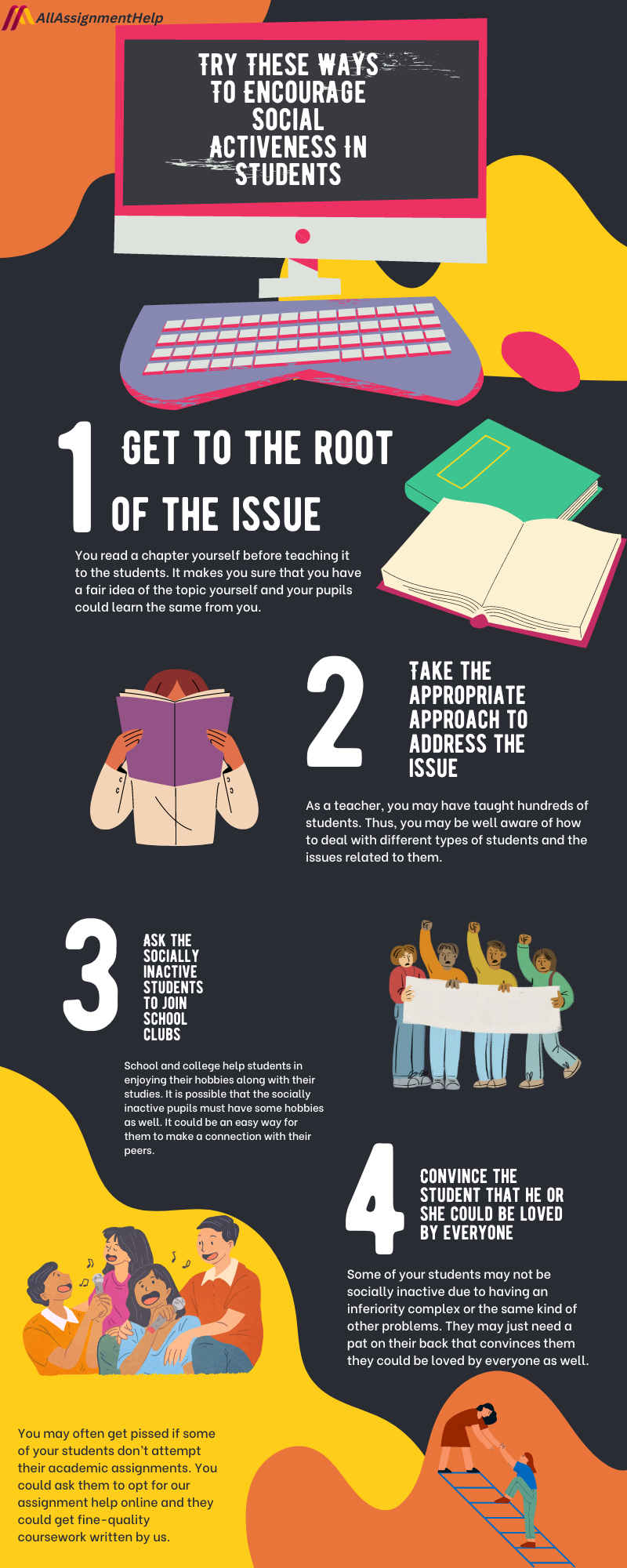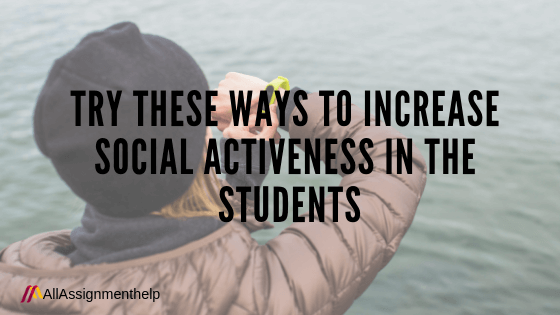Table of Contents
School and college are the platforms that help students in developing connections and relations that could even last forever. Some pupils are a pro at getting along with their peers, however, the case may not be the same for some of the students. And few students take more time to increase their social activeness.
It is time your role starts. As a teacher, it is your responsibility to help the socially inactive students in getting the sheer happiness that other pupils get from hanging out with their peers. Through this write-up, we at AllAssignmenthelp will try to give you an idea of how you could help your students in encouraging social activeness in them.
What Exactly Are Social Skills?
Social skills are the verbal and nonverbal communication abilities needed to build relationships and successfully handle social situations. Think about introducing a puppy to people: When a puppy is young, socialization with other puppies helps it learn how to behave later on. Humans are similar to one another.
People typically think of their everyday encounters when they think about “social skills.” It involves feeling at ease talking to strangers, making friends without much effort, and gaining the respect of your coworkers in order to achieve acceptance from your peers or colleagues.
Try These Ways To Encourage Social Activeness In Students
Socialization games and activities are a great way for a student to learn how to act with his peers, whether he is a toddler, a preschooler, or has just started kindergarten. Games can teach players how to take turns, manage their emotions, and read body language. Today, it is essential to teach students social skills. Use these social skills activities that are supported by research to teach your child about how their actions affect others and how to behave in social situations.

Get to the root of the issue
You read a chapter yourself before teaching it to the students. It makes you sure that you have a fair idea of the topic yourself and your pupils could learn the same from you.
There is some kind of issue with students being socially inactive. You could learn about it by getting to the root of it. Observing the students in different social situations could prove helpful in the same. You could also directly talk to such kids if it seems right.
Read Also: Grading Seems a Boring Task? Try these Ways to make it Joyful One
Take the appropriate approach to address the issue
As a teacher, you may have taught hundreds of students. Thus, you may be well aware of how to deal with different types of students and the issues related to them.
Understanding the problem gives you an idea of the ideal ways to counter it. You should take such ways to help the student that he or she finds easy and helpful.
Ask the socially inactive students to join school clubs
School and college help students in enjoying their hobbies along with their studies. It is possible that the socially inactive pupils must have some hobbies as well. It could be an easy way for them to make a connection with their peers.
So, you should try to find out what entices such students and should encourage them to join the clubs they find most interesting. In this way, you can encourage social activeness in students.
Convince the student that he or she could be loved by everyone
Some of your students may not be socially inactive due to having an inferiority complex or the same kind of other problems. They may just need a pat on their back that convinces them they could be loved by everyone as well. You should not get late in doing so and should help your pupils in any way you can.
You may often get pissed if some of your students don’t attempt their academic assignments. You could ask them to opt for our assignment help online and they could get fine-quality coursework written by us.
Give students as many options as you can
Giving students choices in the classroom is one method to boost their involvement. Students who have options are more likely to be engaged since they can direct their own education. Giving students the chance to work on group projects or letting them pick the subjects they want to study are two ways to do this.
Read Also: Why Teachers Should Encourage Students To Write Assignments?
Develop connections with students
An effective classroom must include students in their learning. In order to create an environment that is conducive to learning, it is crucial to forge relationships with students and capitalize on their abilities. Using enjoyable activities that are pertinent to the content being taught is one method to do this.
Giving children the chance to express their thoughts and viewpoints is crucial. Students will be more involved in the lesson and be more likely to recall the information if this is done.
Make the setting welcoming and engaging
Making a welcoming and dynamic environment is another strategy for engaging students. Students can remain interested in learning by, for instance, employing entertaining images or including fascinating audio excerpts in the classroom. Additionally, keeping the classroom tidy and well-organized can support the development of a positive learning environment and increase social activeness.
Tie your lessons to the actual world
Instead of encouraging students to make connections between what they learn in class and the outside world, classrooms far too frequently teach pupils isolated facts and concepts. This mismatch may be detrimental to the learning and engagement of students. Connecting learning to the actual world is one method to boost student engagement.
A few distinct things can naturally occur in your classroom when students collaborate in small groups. First, students are practicing social ideas as well as effective interpersonal communication and socialization. Through cooperative learning, all viewpoints can be heard. As opposed to when it is a complete class exercise, shy or reticent students are more inclined to speak out and contribute ideas in a small group setting.
How To Be More Social At All Times And Improve Your Social Skills
Your social life and career may suffer if you frequently feel uncomfortable in social situations or find it difficult to start conversations because you are shy.
Manifest Social Skills
Even if you don’t feel like being social, you can act in a more social manner. Don’t let your fear keep you back. Regardless of your feelings of trepidation, decide to talk to new individuals and engage in conversation.
It will become simpler with time, and your social abilities will advance swiftly.
Ask general questions
Learn how to ask open-ended questions if you want a conversation to focus on someone else instead of you. So that you won’t have to engage in pointless small talk, encourage others to converse.
Ask questions that call for a response other than a simple affirmative or negative, and you may throw up the door for the other person to stay in the conversation.
Set objectives for yourself
Set a few manageable objectives for yourself. Maybe you want to work on a specific talent, or maybe you want to start participating in a local social event. Set a goal and start using the tactics that will enhance your social life.
Read social skills-related books
There are several books available that can teach you certain social skills and conversation starters.
Though reading about these abilities won’t make you an expert, keep that in mind. You’ll need to repeatedly practice them.
Be Aware of Your Body Language
It’s crucial to communicate non-verbally. Pay attention to the manner in which you present yourself. Make an effort to appear at ease, maintain acceptable eye contact, and project an attitude of openness to discussion.
Sign up for a support group for social skills
Social skill assistance groups are available in many localities. Support groups assist those who experience acute shyness, awkwardness, or anxiety in social situations by teaching and practising new skills.
You’ll start developing your social abilities and might be able to meet some new pals who can relate to your struggles.
So these are some activities which you can adopt to increase your social activeness. In case, due to your academic workload, you are not getting enough time to involve in social activities, you can get our help. We offer online class help, assignment help, coursework help and many other services to busy students.
FAQs
| Ques.1. What social skills are the most crucial to master? Ans.1. One of the most crucial social skills is the ability to modify your conduct and conversation subjects to suit your circumstances. You are not a fake if you know how to blend in. It implies that you are aware of social customs and can put others at ease. |
| Ques.2. What advantages does attentive listening have in social environments? Ans.2. You will gain from active listening in social circumstances as you meet new individuals. Learning more about the individuals you encounter can be accomplished by asking questions, getting clarification, and observing body language. |
